This is what the new Earth Systems Science Building (ESSB) will look like in a few years:
This is what the oppression of indigenous communities’ rights looked like in Guatemala in January, 2005 (including 1500 police and 300 military officials to fight 2000 indigenous farmers):
Unrelated?
Not as much as you would like to think.
In 2007 UBC received a $5 million grant from Goldcorp for the ESSB, which will include a ‘Goldcorp Inc. Teaching and Learning Wing,’ and President Stephen Toope said that the University was ‘absolutely delighted’ with the participation of Goldcorp in the project.
As any informed Guatemalan, talking about Goldcorp is a little touchy for me. And so with all the news about SFU I decided to look into what links exist between UBC and Goldcorp, one of Canada’s largest multinational gold mining companies. It turns out that there are quite a few.
Apart from the ESSB; the Liu Institute for Global Issues, the National Centre for Business Law and the Mineral Deposit Research Unit.
All ‘supported’ by Goldcorp.
Why should I care?
Since 2005 Guatemala has seen the environmental and social effects of mining. All thanks to Goldcorp.
The communities of San Miguel Ixtahuacan and Sipacapa have been home to the Marlin mine, an open pit gold and silver mine. If you know a little bit about open pit mines you know what they do do their environment.
Total destruction of vast areas of what has been agricultural land for hundreds of years. Also, according to a national environmental NGO, the mine uses in one hour the amount of water that a local family uses in 22 years.
Constant explosions have cracked the walls of at least 150 brick houses in the area. The company argues that it is the residents’ fault because of the volume of their speakers when they listen to music and their maize grinders.
Total disregard for indigenous people’s rights, including the right to decide the use of their land, as was stated in our Peace Accords of 1996. The government and the mining company refused to consult local communities about this project. The communities responded by organizing their own consultations. Of 13 communities consulted 11 rejected the project, 1 abstained and only 1 supported it. The government has yet to recognize these consultations, further denying the people this right.
Contamination of water systems. To separate the gold from other rocks the material is ‘bathed’ in cyanide. Cyanide can have dangerous effects if released into the environment. One teaspoon of a 2% solution can kill a person. Just last month the Marlin Mine discharged cyanide-contaminated water into a local river (at night).
The disappearance of community leaders that rejected the mine. Also, increased conflict within families as they may include one of the 200 people benefitting from the mine (of about 60,000 residents).
In 2010 the Inter-American Commission for Human Rights of the Organization of American States, the Guatemalan Ministry of Environment, members of the European Parliament and hundreds of national and international NGOs have asked the Guatemalan government to order the immediate closure of the mine to ensure the ‘life and integrity’ of the 18 communities affected by the irresponsible mining practices.
The mine is still open.
What does UBC have to do with this?
Our clothes from the bookstore have a little label that says ‘sweat-shop free.’
Our coffee at the Blue Chip Cookie is ‘fair-trade.’
Our to-go plates and cups at any UBC Food Services location are compostable.
As much as possible, our food is organic and our eggs are free-run.
But what about the places where we are formed, where we learn how to do great things ‘from here’ and where we spend most of our time?
If we aim to be responsible and aware and global (and all those other nice things that we hear so much), shouldn’t we seek partners that share our values as an institution?
I, for one, do not feel comfortable being part of Goldcorp’s ‘corporate responsibility.’ It is because of these grants, which apparently we (?) are ‘absolutely delighted’ to receive, that bills such as C-300, which would have made Canadian companies responsible for their projects in other countries, failed a few months ago.
The story of this mine is replicated all around the so-called ‘third world.’
As a ‘third-world’ student (and there’s quite a few of us at UBC) I ask what promise UBC is making.
What example is our administration setting for our ‘global leaders’ to follow? What is UBC telling me, and so many other students, by accepting money from a company that is creating social conflicts and disregarding human and environmental rights in my country?

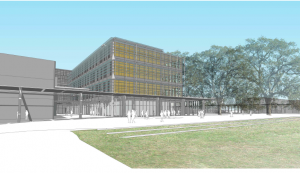
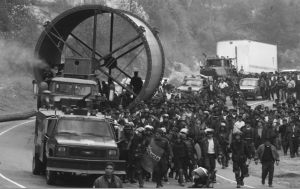
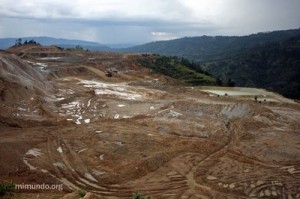

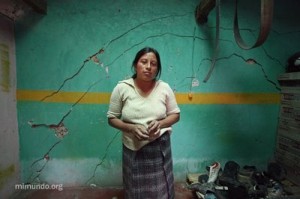
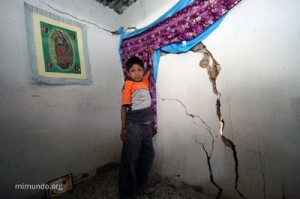
Dear Valentina,
I read through your article and it really touched me. First off, I could not explain why Goldcorp would discharge cynide chemicals into a river, knowing that the BC government today is spending millions of dollars to clean-up the mess following the impacts caused by the Britannia Mine. I’d expect at least all Canadian Mining companies (especially Vancouver based ones e.g. Goldcorp) to learn from this unethical and irresponsible mining.
Talking about other mine environmental impacts, I believe that the mining industry is doing an enormous amount of work to ensure the environmental laws are obeyed and the impacts are kept to the minimum level. In fact, environmental impacts are usually 0.03% mine related (The BC Mining Plan, 2005) and of this, most of it is reclaimed following the closure of the mine.
Another critical point mentioned in this article is the blasting practices operated by Goldcorp. Blasting is normally associated with energy transmitted in the form of pressure waves. The propagation of the pressure waves depends on the geology and distance between the blast area and the area of concern. It also depends on the amount of explosives put into the blast holes among other controllable factors. I am, however, not here to discuss about a scientific research paper. What I am trying to say here is that the cracks in the people’s houses could easily be reduced/eliminated by governmental laws. The Peak Particle Velocity (PPV), which cause ground shaking and vibration, could be set by the government so that it does not cause cracks. I know the State of Nevada did set to 0.25 and then changed to 0.5 in recent times. What these values mean is that Goldcorp will be forced to reduce the amount of explosives used in the blast holes thus decreasing ground vibration.
So where am I heading to?
It sounds to me that we are trying to question UBC for accepting grants from an environmentally and socially irresponsible company. I think UBC does not really need to come into the scene at all. We need to discuss of the ways that can help solve mining problems especially in the developing world. We need to us UBC’s theme “from here” to solve our real life challenges and Goldcorp-Marlin is one of them. We all love grants because they help us get work done quickly. Unless we want to know the details behind Goldcorp-UBC relationship the discussion is unnecessary. We know how much we do benefit from Goldcorp’s funded constructions at UBC. We know how useful will the ESSB be to us. In short let’s try to draw our attention to the Impacts of Goldcorp and Other Mining Companies (if so we choose) to the Global Community.
I forgot a conclusion here:
I am very glad you raised this issue Valentina. So much can be said about this matter. As mining engineers of the future these are the lessons to learn well in advance before we set foot into our careers. I hope you are enjoying your holidays.
I wonder how they would respond.
What about the promise of the placement of Coca-Cola products on campus in return for monetary compensation?
http://killercoke.org/
http://www.publicaffairs.ubc.ca/media/releases/2001/mr-01-49.html
Oh, wow. I didn’t know this side of the new EOSC building. Thanks for letting me know!
btw: Did UBC agree to do anything in return for the money besides naming the building?
no idea…
thanks mhula! you are very right, you’ll be my favorite mining engineer when you start working!
Hi Valentina, this is such an amazing piece. Thanks for posting the link on the Ubyssey article.
If you haven’t heard, there is a conference at UBC on Corporate Social Responsibility you might be interested in.
Corporate Social Responsibility in the Pacific Rim Conference
Dates: Thursday, Apr 14, 2011 to Friday, Apr 15, 2011
Place: Conference Room 120, CK Choi Building, 1855 West Mall
(think you have to check the conference agenda for the time of the panels)
thanks again,
Krissy
Pingback: UBC Accepts a $5 Million Dollar Donation from Gold Corp, But at What Cost? « SJC Volunteer Blog
Thanks for this article. Following where Tyler left off, I would like to find out more about guidelines at UBC for accepting corporate donations. Has anyone made any inquiries at UBC? With respect to the Goldcorp funding, I would like to know where the money went, what were the acceptance conditions, and more generally what provisions are in place if the activities of the corporation in question are found to contravene ethics of UBC. Any leads?
Hi,
I wish I could help you with all those questions, but I have no idea… Do let me know if you find out though!